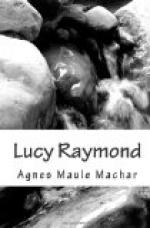“But would she be good to Nelly?” inquired Mrs. Ford.
Mrs. Thompson promised to inquire of the friend who had written to her, in regard to this point. Her correspondent’s reply was tolerably satisfactory. Mrs. Williams, the person who wanted Nelly, was likely to do whatever was right by any girl who might be sent her, as she was a very respectable person, and “a church member.” This last statement weighed considerably with Mrs. Ford, and decided her to mention the place to Nelly.
Nelly could not help feeling a throb of regret at hearing that there really was a place open to her, for she dreaded exceedingly the prospect of leaving her kind friends; but of this she said nothing, and tried to seem pleased with the idea of trying the place. One great inducement it certainly had, that it was in the city in which Lucy now resided. She hoped to see Miss Lucy sometimes, and she would help her to be good and do well, she thought. Mrs. Ford also thought this circumstance a favourable one, as Lucy could see for herself whether Nelly was comfortably situated, and if not, could help her to find a better place. So, after much consideration and some misgivings, it was reluctantly settled that she should go. Mrs. Thompson’s brother was going to the city soon, and Nelly could accompany him.
She did not need a great deal of time for preparation, though Mrs. Ford kindly provided her with all that was necessary for her respectable appearance in her new place, so that she went back to the city which had been her former abode a very different-looking girl from the barefooted, gipsy-like child, who had wandered, uncared for, about its streets. “I know the place well, ma’am,” she said to Mrs. Ford; “it isn’t as if I had never been there. I won’t feel a bit strange.” And though the spring was approaching, and she was for many reasons very sorry to leave Ashleigh, she did not dread the thought of going to the great city, alone and friendless, as much as a thoroughly country-bred girl would have done.
When her travelling companion bade her good-bye at the railway station, Nelly, not in the least frightened by the hurrying crowds and the noisy streets, so familiar to her of old, took up her little bundle, containing all the worldly goods she possessed, and set off briskly to look for the address inscribed on the card she held in her hand. She did not need to ask her way more than once, though it was a half-hour’s walk before she reached the street, and then she walked slowly along, studying the numbers of the doors till she arrived at the right one, bearing on a brass plate the words, “Mrs. Williams’ Boarding House.” It was one of the most bare and uninviting of a dull row, and not even the bright sunshine of the early spring could enliven it much. Other houses had flowers or birds in the windows, or at least pleasant glimpses of white curtains, but this one, with its half-closed blinds, had almost a funereal aspect. Nelly had a keen susceptibility of externals, and her heart sank a little; but she rang the bell, determined to make the best of it. The door was opened by an elderly woman in rusty black, with a hard, careworn face, which did not relax into the slightest perceptible smile, as she regarded Nelly scrutinizingly, saying at last, “Oh, you’re the girl Mrs. Thompson was to send, I suppose?”




